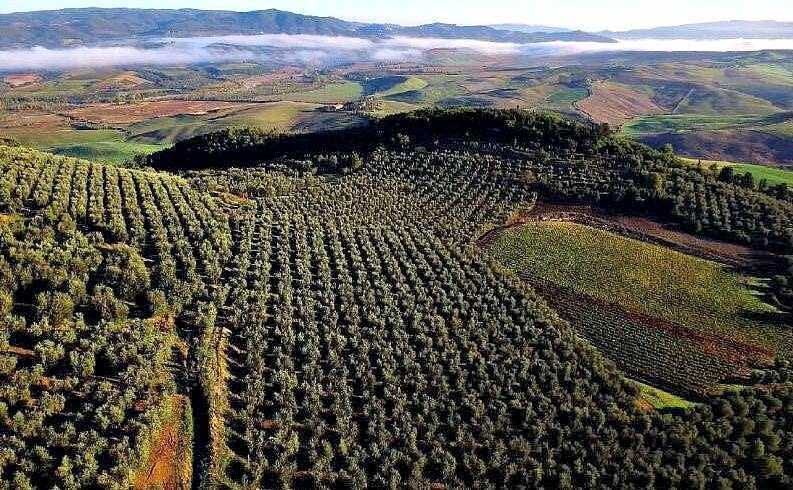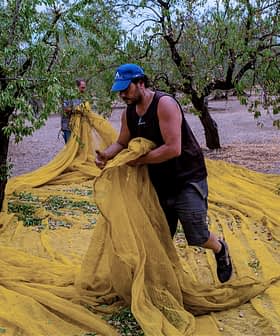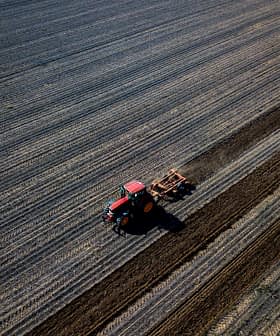6th 'Extrascape' Recognizes Outstanding Olive Oil Landscapes
The 6th edition of the competition for the best extra virgin olive oil landscapes, Extrascape 2017, concluded a two-day event that included several speeches by experts in the field.
 Frantoio Franci, Tuscany
Frantoio Franci, TuscanyOn June 9 and 10, the evocative cloister of the Convent of Jesus and Mary in San Martino in Pensilis, in Molise, was the stage of the 6th edition of Extrascape, the international competition for the best “olive oil landscapes.”
This recognition has an added value as it enhances an important aspect of the production of extra virgin olive oil.
The association of producers Molisextra organized the event, and its members choose not participate in the competition, as impartial supervisors for the sessions of evaluation which covered both the organoleptic profiles and the aspect of the lands of origin of extra virgin olive oils, which reached Molise from several countries.
“We created this competition with the desire to reward not only the quality of product but also its landscape, intended as the producer’s commitment to safeguarding and thus protecting the territory,” said one of the organizers, Giorgio Tamaro.
“This aspect becomes an important expression of quality, as it is now evident that successful extra virgin olive oils always came from outstanding landscapes, both from Italy and from abroad, and this means a well-managed and respected environment,” Tamaro added. “Over the years, there has never been a dissonance between the winning olive oils and the pleasantness of their landscapes.”

Frantoio Franci, Tuscany
The results of the contest were assessed by two boards respectively led by the panel leader Vitor Ugo Fratini, and by Achille Ippolito, the coordinator of an inter-university PhD course in landscape and environment design, management and planning at the Sapienza University of Rome.
Thanks to the partnership between this doctorate and the master course in cultural landscape planning and promotion of the University of Molise coordinated by Luciano De Bonis, the first morning of the event was devoted to an articulate workshop on landscape-related topics.
During the afternoon, the suggestive cloister became the set of an ‘unconference’ attended by experts of the sector who gave speeches on promotion, communication and awareness of producers and consumers in Italy and abroad, with a special focus on the United States.
A roundtable on the use of extra virgin olive oil in restaurants gave rise to a lively debate on latest trends of food service.
“It is fundamental for the restaurateur to know extra virgin olive oil, how to communicate it and how to give value to it, not only in the kitchen but also in the service area,” observed the olive oil consultant and owner of the olive oil shop ‘Oleonauta’ in Rome, Simona Cognoli.
“In addition to meeting the territorial aspect of cuisine, it is important to choose the variety according to the dish, aiming at its best expression with the ingredients and during cooking,” she pointed out.
On the second day, olive oil DNA was a main topic, being a new frontier in tackling frauds but also a tool to promote biodiversity, as highlighted by Luciana Baldoni, a senior researcher at the National Research Council’s Institute of Biosciences and Bioresources of Perugia, and by representatives of the Carabinieri Command Unit for environmental, agri-food and forestry protection.
The association Molisextra presented a project, that will be developed in the next months, which aims to restore degraded ecosystems of olive groves under organic farming.
The event concluded with the award ceremony. “This recognition has an added value as it enhances an important aspect of the production of extra virgin olive oil,” said the winner of the category ‘traditional landscape, conventional extra virgin olive oil, medium fruity,’ Lidia Antonacci.
“When you open a bottle of high-quality extra-virgin olive oil you can find in its attributes the connecting factors with the land to which it belongs,” said the Apulian producer of Mio padre è un albero, whose deep connection with the territory appears in the name of her farm which means ‘My father is a tree.’
The special award ‘Francesco Ortuso,’ which was assigned to the person who embodied professionalism, transparency, humility and determination in carrying out his work of safeguarding, defending and enhancing authentic extra virgin olive oil, went to a colonel of Carabinieri Command Unit for environmental, agri-food and forestry protection, Amedeo De Franceschi.
Another special award went to the former State Forestry Corps, which recently merged into the Carabinieri unit, in the person of general Rosa Patrone, with thanks for the notable technical and human contributions since the first edition of Extrascape.
Winners of Extrascape 2017
Traditional Landscape Category Conventional
Light Fruity: Aziende Agricole Di Martino, Apulia
Medium Fruity: Azienda Agricola Lidia Antonacci, Mio Padre è un albero, Apulia
Intense Fruity: Accademia Olearia, Sardinia
Traditional Landscape Category Organic
Light Fruity: Azienda Agricola Caruso, Sicily
Medium Fruity: Fattoria Altomena, Tuscany
Intense Fruity: Frantoio Franci, Tuscany
Contemporary Landscape Conventional
Light Fruity: El Empierdo, Dop Cordoba, Spain
Contemporary Landscape Organic
Light fruity: Agricoltura Cericola, Apulia
Medium Fruity: Azienda Agricola Stefano Gregori, Marche
Special Mention, Best Mill Architecture
Valle Quilimari, Chile
Extrascape Mention 2017
Frantoio Vicopisano, Tuscany








